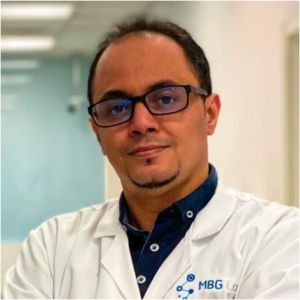
Mohamed Belhocine
Senior Bioinformatics (Molecular and genomics center; Dubai)
Mohamed is a distinguished Senior Bioinformatician, currently based at the prestigious Molecular Biology & Genomics Centre in Dubai. In this capacity, he not only oversees research projects but also conducts clinical NGS data analysis. His role extends beyond the laboratory, as he plays a pivotal role in the development and management of research training programs across multiple Algerian universities, demonstrating his commitment to nurturing the next generation of scientific talent.
Mohamed’s skill set encompasses both experimental and computational biology, making him a versatile asset to any scientific endeavor. His proficiency extends to transcriptome analysis and cutting-edge techniques like chromatin immuno-precipitation coupled with deep sequencing (CHIP-Seq) and RNA-sequencing analysis. Moreover, Mohamed’s mastery of various programming languages, including R, Python, Perl, and JAVA, underscores his ability to harness the power of technology in advancing biological research.
Throughout his career, Mohamed has exhibited a remarkable dedication to unraveling the mysteries of genetics and epigenetics in both normal and pathologic cell development. His pioneering work at TAGC and Necker Hospital revolved around the application of large-scale genomic approaches. Of particular significance is his identification of a cluster of Long Non Coding RNAs (LncRNAs) whose dysregulation holds implications in leukemia. Mohamed conducted rigorous functional assays to shed light on their potential roles in oncogenesis, deepening our understanding of this complex disease.
Additionally, Mohamed’s expertise shines through in his evaluation of enhancer activity across diverse cellular contexts. He fearlessly ventured into uncharted territories, exploring cell stimulation, transcription factor perturbation, and pathological models. In the realm of in vivo research, he meticulously examined the dynamics of select histone modifications and transcription factors during early T cell development. His endeavors were conducted in close collaboration with the esteemed European Blueprint consortium, reflecting his aptitude for teamwork and interdisciplinary research.
One notable hallmark of Mohamed’s career is the profound impact of his research. His recent publication titled “Dynamic of broad H3K4me3 domains uncover an epigenetic switch between cell identity and cancer-related genes” made the cover of the esteemed Journal of Genome Research. This achievement underscores the paramount importance of his discovery in the realm of cancer diagnostics and treatment, where his work has the potential to revolutionize the field.
